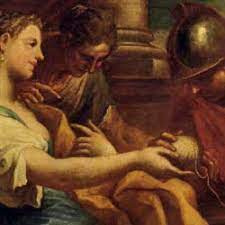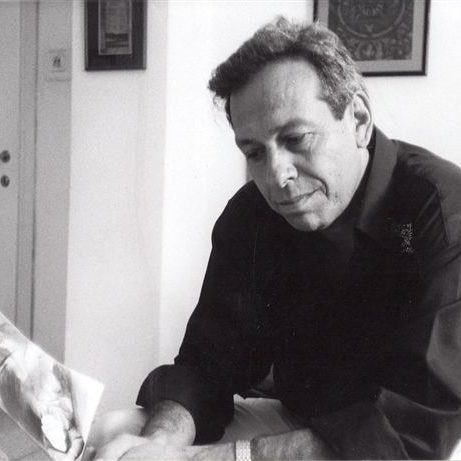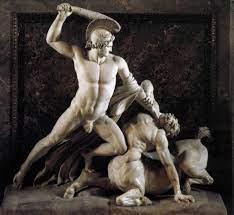Coping with the power of passion, Eros, and everything in between the place of the emotional-human relationships
In the myth of Theseus, we will see a system of interesting cooperation of several gods, in fact, some different archetypal forces that share in the creation and development of the human Ego& self that is being shaped in the cores of human development. And alongside the development of humans appear new monsters created due to the conflict generated by impulses of eros and the need for power. As we have seen in previous myths, the interrelationship between God and Man is here between Theseus, his parents Etheria and Aegeus, and the gods Poseidon and Aphrodite and later also partner Dionysus. Theseus is also a hero with all the signs of distress into which every hero is born, who will symbolize the human ego that grows and seeks its path.
He was born in distress and has two fathers, of whom it is not clear which of them gave birth to him. And therefore, he possesses two fathers, one son of a human father, Aegeus, and the other.
archetypal father is the god of the sea, Poseidon
The birth of the human Self and Ego is an act with a superhuman, ethereal, archetypal spark, and in this respect, the touch of the god
Poseidon implies that the great father, in this case, is connected to the sea, unconscious of the raging emotions, to the instinctive world of passion. Poseidon is also a god who has trouble with relationships and is usually raped! The sea is also the source of the birth of Aphrodite, a goddess born of the castration of the power of Uranus, the great father, next to Gaia, the great mother, and her sons. That is why there are also issues of domination, excess power, "wrath of the nose"-Indignation, and unbridled desires that must be learned to tame. And as expected, we see that the classic Hero is predestined to be in a problematic situation also from the point of view of the personal father – who does not raise him directly and leaves the upbringing to the great grandfather – Etheria's father who created the complex situation himself. He created this because of a seemingly problematic, inseparable relationship with his daughter, Either! The intergenerational situation has created confusion in the psyche of the Hero and, perhaps, consequently, the need for the hero's struggle to reconcile the contrasts within him. These monsters are generated in situations of injury and internal conflicts. Unlike Hercules, the mother complex, Hera, stood out.
Family distress is also the lot of Theseus when his grandfather Pentheus wants his daughter Etheria to give birth to a son, a grandson who will be his son, without his daughter leaving him and moving to her husband's house. It is said that the plan of the father Pentheus, the grandfather of the future hero, was to connect even for a night with his good friend Aegeus, king of Athens, while the king himself did not know what his friend Pentheus was planning for him. And the story was so, and it is important to know it because it lies in the heart and perhaps in the complexes of the hero who is to grow.
King Aegeus, who lacked sons, went to the Oracle to hear about his fate. In his meeting with Oracle and his desire to consult, he was told that he would not take off his sandals on the way until he reached his palace in Athens. Aegeus did not understand the message's meaning, and on the way back to his palace, he was delayed visiting the palace of his friend Pentheus in Throizen.
Pentheus, this time generous at the expense of his daughter, offered him her bed, which he would sleep with overnight, after watering it with wine for the rabbi and obscuring his spirit.
That fateful night, Aegeus did take off his sandals and spent a whole night in Etheria's bed.
When he got up in the morning, Aegeus put on his clothes but left his sandals and sword in Etheria's room, so he told her. "I leave my sandals and sword under a big, heavy stone! If you give birth to a son who will be strong, strong enough, and able to pick up the stone, he will take my belongings, put on my sandals and sword and go to my Palace, to Athens in search of me.
Aegeus is revealed here as a forceful father who does not contact his son or beloved, is addicted to his passions, and challenges his son without any real investment. A safe formula for creating a complex in the son.
Because already from his request, we see the direction of the father's thought and his motivation for the power and acceptance of a son, only if he is strong and heroic. Etheria (of the air), known for its strong spiritual connection to the god Poseidon, the powerful god in the kingdom of Throitzen, apparently became pregnant that night but rumor said that the pregnancy was formed from the sexual connection and connection she had with the god Poseidon and not King Aegeus.
Our hero Theseus grew up knowing he is the son of the god Poseidon; such knowledge shapes the spirit of the Hero. In addition to his admiration for the god, Poseidon is well known; there was
also, his admiration for the hero Hercules's revered character goes hand in hand with the young hero's wish for power and heroic deeds.
But the one who raised him, and perhaps it is a good thing that this is the case, was his grandfather Pentheus who took care of all his needs, his royal upbringing, and of course, his role model was a well-known relative who is Hercules. As a child, Theseus adored Hercules, imitating him and learning all his secrets. He is not afraid of the lion's fur that he would represent in his grandfather's palace, and the sound of
Theseus goes far and wide as a teenager for his courage and physical strength.
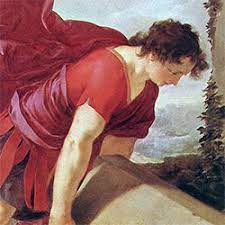 .
.
Theseus the teenager who grows up with different father substitutes and a spiritual mother. Of course, he finds the large stone laid by his father, moves it, and discovers the sword and sandals of Aegeus Sr. He hears from his mother about the strange story that his father is the king of Athens, and he goes on a long journey to the city of Athens to look for his father. The journey to the father is a journey in search of his lost masculinity, the search for empowerment to balance the power on the one hand and the Eros and relationships on the one end, and the ability to harness her to life for strength and fertility. And perhaps heal the father's wound that the hero will bear all his life.
On his way to Athens, Theseus does miraculous deeds with the help of his power and intelligence. Its power is immense, its level of sophistication without limits, and it frees various cities from evildoers, thieves, and robbers.
There is no limit to his heroic deed, and his hearing goes far and wide. Even before arriving in Athens, one already hears about such a young man and one who does miraculous heroic deeds. He rescues, helps, and liberates later areas of Greece from the forces of evil, injustice, and injustice.
As the boy approaches Athens, he is temporarily in danger when his father's new wife, Medea. Aegeus has a new and additional reincarnation after Medea's life with Jason. Medea predicts that the absent son of her husband, the king, will come and take his reign from her new sons. So before arriving at the palace, she plans to poison Theseus so that he does not take the inheritance of her joint sons with Aegeus.
It is said that when Theseus approached Athens and appeared from afar with his special hairstyle (Kare) and a dress that was not customary in Athens, the boy appeared to the local people as a girl teenager. He had a strange and different costume, a purple dress uncharacteristic of the people of Athens, and on the other hand, beautiful and with a body like Hercules. The laughter of the wall guards provoked outrage in Theseus, and immediately upon arriving in the city, he participated in a provocation in which he proved his strength and landed his arm.
The rumor reaches his father's palace, and there, in addition to the suspicions of Queen Medea, he is in mortal danger. However, fate works differently because as soon as he arrives at the Theseus Palace, he is revealed to his father, who recognizes him by the sword and sandals. He quickly becomes the king's favorite in the palace, to Medea's anger.
The relationship between the son Theseus, who will become in the future an important king, and the father, King Aegeus, is extremely short. Theseus immediately sees the great sadness and distress in which the Grand Palace is subjected. He becomes acquainted with the mourning and gloom surrounding his father and the tragedy from which Athens suffers. The tragedy is that of the kingdom of Minuit (crate) over Athens, manifested in the walk of the Athenian boys and girls to be victims of a monster Minotaur imprisoned in Crete. Theseus, a typical heroic young man, as a son who must prove himself to his father, investigates the matter and decides to go to Crete. He volunteers as one of the heroes who will fight the Minotaur and free Athens from the terrible punishment. Theseus, which he must compensate and prove, occupies his place in his father's eyes but also as a lifeline of power, overcoming wants and immediately willing to sacrifice himself for the task. The relationship with the father, who is happy for him and tries to delay him from going to Crete, is less interesting. He wants to save, prove and get a mission.
Aegeus, the elderly father who has just become acquainted with the son, is sad and painful and tries to motivate Theseus, but this insists. And the father knows the soul of a heroic son man and only asks for Theseus: "You go out with black sails and please promise me that you will come back with white sails". .. "I don’t want to lose you."
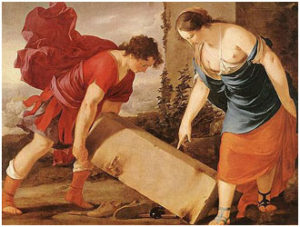
For us, Theseus symbolizes a hero who moves between the need to prove his masculinity, strength, and victory, save, and a person who is supposed to balance the theme of eros, love, relationships, family, and the ability to relate to the other.
The myth that we are dealing with here raises the need for the ego to get along and deal with damage to the relationship, with the lack of a balancing father and a tower, with the difficulty of maintaining a balance between eros and power between love and the need to conquer and dominate. Instincts versus attitude. A central issue in life and therapy.
The story of Theseus is made from a vehicle, it continues by the fact that he embarks on his journey in Crete to be one of the boys sacrificed to Minotaur when from here on out, the goddess Aphrodite is the goddess who leads and helps the protagonist to succeed in his mission. This is not the strategic Athena, and it is not Artemis. The woman's love, relationship, and connection will help the Hero. But in love and relationships, we will also see the protagonist's failure, they will also fail him.
Theseus ranges from his ability to use force to his temporary ability to avail love of iris in relationships. And both impulses Power and Eros, are important in the performance of his task, which is overcoming the Minotaur.
And who is this monster in our story? What does the minotaur symbolize, and how is it related to power and to iris to passion and greed, both to belligerence and intrigue to territoriality and to the inability to thank the gods and therefore to a kind of hubris that feeds on power and boundless passion?
The story of this monster dates to Crete, the center of Minuit culture. Crete is an island surrounded by the sea where a magnificent culture and royal dynasty have emerged. The beginning of this dynasty is in King Minos, who himself was an illegitimate son of one of the previous kings. Minos boasted to his fellow rightful sons that he was the one who had to inherit the kingdom because he was minus the son of the god Poseidon! And as proof of this, he claimed to receive a signal from Poseidon, with the help of a magnificent bull and fire-spitting wonders, which came out of the sea after a short prayer for Poseidon. Minos in his prayer, is narrated, he swore to Poseidon that he would return the bull while offering it as a sacrifice to God after he became king! That was the deal with Poseidon! The award, in the form of the large and beautiful bull – the animal that symbolizes a peak of power and fertility in the Kingdom of Crete – was indeed given, but it was not returned to Poseidon. Minos and his wife Pasiphae coveted him and his eternal power and decided not to hand him back to his senders.
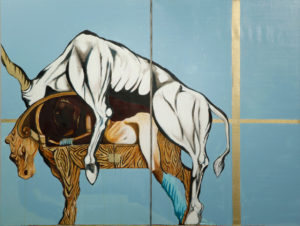
The passionate Queen Pasiphae also persuaded Minos not to deliver and unusually coveted him. The punishment of that Minoan couple was that Pasiphae would fall in love with the bull with an unbridled desire for actual mating! A punishment that made her turn to an artist, architect, and engineer, Dedalus, who would help her realize her passion.
Sex, instincts, and greed were the lot of the couple Pasiphae Minos and Dedalus helped the queen carry out her scheme. Pasiphae entered a precisely designed sculpture in the form of a demanding cow, the bull breaded her, and she even began to grow the fruit of his seed in her belly. Out of the belly of the passionately punished Pasiphae, a monster was born whose lower half Man and the top half bull. It is a monster that must be fed with human flesh in the form of young boys and girls. And if she does not receive her portion, she will go wild and eat everything that appears in her path.
After Crete defeated Athens and demanded various territories as annexation from it, it agreed to give up large parts in exchange for the sacrifice of boys and girls. Every seven years, they must be sacrificed in the complicated labyrinth of Minotaur. A labyrinth created by the famous Dedalus! All this will happen until one of these Athenian boys overcomes the Minotaur and frees Athens from such punishment. And this is where the story of Theseus, who volunteered to be on the last boys' expedition and overcome the Minotaur, comes together. As indicated in the story, the road to this heroism and victory over the Minotaur is associated with love. Only with the help of love will Theseus overcome the monster. And this is where the king's daughter Minos Ariadne enters the story that she knew the labyrinth's secrets from her connections to Dedalus. She was the one who was supposed to fall in love with Theseus and help him in his mission to eliminate the monster that is her brother. Princess maidens of the type of Ariadne we will also meet in the story of Jason and the Golden Fleece. Jason meets Medea, who is cheating on her family, and helps him to take her to Greece and free her from her adored father's home. Here, too, the goal of Princess Ariadne, who helps the hero, is for him to free her from the house of her tyrannical father and take her with him to Athens.
And so, as soon as Theseus arrives in Crete, the goddess Aphrodite brings about a kind of infatuation like Ariadne in Theseus. It is this infatuation that causes the princess in distress to promise the hero her help. She is under the control of her forceful family and is waiting for salvation from the protagonist. Ariadne's help was in detailed guidance and the discovery of all the secrets about the location of the minotaur within the labyrinth. To the labyrinth where all the previous boys got lost in it! The assistance is done with the help of a ball of wool that the princess will always hold from the outside so that Theseus, who binds the wool thread to his belt, will know how to return after killing the Minotaur. The thread along the way to and from the monster after performing the task symbolizes the love bond of the protagonist to the princess and the help that receives through love. The love and attachment to the woman the femininity allow us not to get lost.
They show the winding road in the labyrinth's heart and the ability to act in such darkness.
The bond of love, the fiancé, and not only the power allows one to carry out the mission.
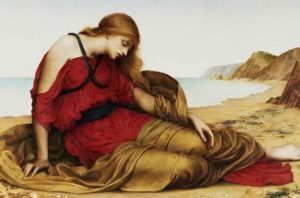
. Get rid of a monster of power, possessiveness, and greed. Love makes it possible to overcome a monster whose head is the bull and whose lower part is a man. This is a more dangerous monster than the connections of her life that a man headed. This monster can only be eliminated with the help of love and connection without entanglement!
Walking to the dreary Theseus protected, he will not get lost, he is also instructed to lower the Minotaur rays and use those horns against the monster. Theseus is very successful in his mission; he is in love with Ariadne and prepares to take her with him on his return to Athens. Ariadne's sister Phaedra also sneaks onto the ship heading towards Athens via Naxos Island.
But it turns out that the main problem of Theseus is not solved. When he arrives at Naxos, he decides to give up Ariadne, and the rumor is that he does so because it is destined for the god Dionysus. But to her chagrin, he gives her up in favor of her little sister Phaedra.
Theseus' problems in the iris field were not resolved even though Dionysus, the god of wine, was destined to be Ariadne's partner, and he had to give her up. The fact that he is unfaithful and that Dionysus enters the picture adds to the entanglement resulting from the inability to cope with the world of passions typical of the kingdom of Minos and Pasiphae!
Be that as it may, on his voyage to Athens to return to his father, Aegeus forgets Theseus to change the ship's black sails to white! He forgets his promise to his father, and the ship returns with black sails. It is told that the father concludes that the son failed in his mission and died, and he decides to commit suicide in the sea, the same sea named after him, the Aegean Sea.
Later it is said that the tragedies do not stop landing on the house of Theseus when his second wife Phaedra falls in love with his son Hypoliths who was born from another wife, Hypolith, queen of the Amazons. It is
said that Aphrodite was complicit in punishing the house of Theseus because the whole subject of love became too small a side part compared to the power and logos in the house of Theseus.
The human ego in a constant conflict between power and Eros, Logos and Eros, and the inability to mobilize love for fertility, attitude to the other, and the correct connection of power and passion is at the center of the myth.
